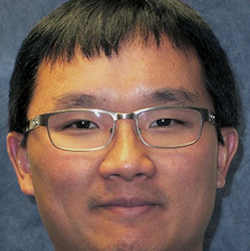Machine-Learning Tool Reduces Gestational Age Estimation Uncertainty
The new method results in a three- to five-fold reduction in the uncertainty in determining gestational age.

Russell Fung, PhD
Investigators have applied a machine-learning technique to substantially reduce the uncertainty in gestational age estimation.
The team, led by senior scientist Russell Fung, PhD, found machine learning was able to circumvent longstanding limitations in determining fetal gestational age and future growth trajectory. The findings suggested using the algorithm in clinical practice could lead to the management of individual pregnancies and improve population-level health.
“Compared to existing techniques, the new method results in a three- to five-fold reduction in uncertainty in determining gestational age,” Aris Papageorghiou, MBChB, MRCOG, said in a statement.
The investigators aimed to improve estimates of fetal gestational age and provide personalized predictions for future growth. They used a machine-learning algorithm originally developed to make ultra-slow-motion movies on exploding molecules. They used data from a global study on the health of mothers and babies during pregnancy and through the child’s second year. The study, International Fetal and Newborn Growth Consortium for the 21st Century included a sample of healthy, well-nourished participants in a large, multicenter, population-based study that involved a network of more than 300 researchers and clinicians from 27 institutions in 18 countries.
Fung and the team used three independent algorithm methods. In method A, the algorithm was provided with 2 sets of ultrasound measures from a previously unseen fetus. The algorithm needed to determine the time interval separating them. In method B, the machine-learning algorithm was given a single set of previously unseen ultrasound measures collected at 1 visit and asked to estimate the gestational age.
For the final method, the algorithm was given fetal biometric measures from 2 visits without timing information and was asked to forecast the time of a subsequent scan of the fetus. To assess the accuracy of the algorithm, it was trained and tested with data from the Fetal Growth Longitudinal Study.
The investigators estimated gestational age between 20 and 30 weeks of gestation with a 95% confidence interval within 3 days. They used the measurements made in a 10-week window spanning the second and third pregnancy trimesters. Fetal gestational age was estimated in the 20-30 gestational age window with a prediction interval three- to five-times better than with any previous algorithm.
“This will enable improved management of individual pregnancies,” Fung and the team wrote.
Further, six-week forecasts of growth trajectory for a given fetus were accurate to within 7 days, which the study authors noted could help identify at-risk fetuses more accurately than currently possible. Higher accuracy was expected to improve fetal growth charts and population health assessments.
“Applying this technique to neonatal health has the potential to improve management of individual pregnancies, and boost population-level health,” corresponding author Abbas Ourmazd, PhD, said in a statement.
The study, “Achieving accurate estimates of fetal gestational age and personalised predictions of fetal growth based on data from an international prospective cohort study: a population-based machine learning study,” was published online on The Lancet Digital Health.